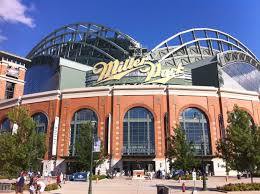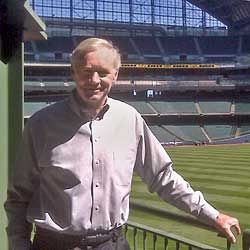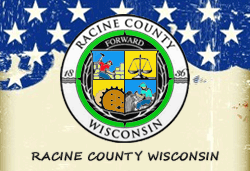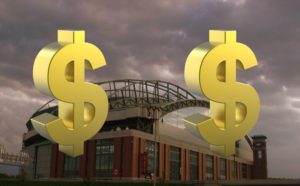 On October 22, 1996, construction commenced for a new baseball stadium to replace County Stadium in Milwaukee; this new ballpark became known as Miller Park.[1] The first sanctioned Major League Baseball (MLB) game was played in Miller Park on April 6, 2001 in a game between the Milwaukee Brewers (Brewers) and the Cincinnati Reds.[2]
On October 22, 1996, construction commenced for a new baseball stadium to replace County Stadium in Milwaukee; this new ballpark became known as Miller Park.[1] The first sanctioned Major League Baseball (MLB) game was played in Miller Park on April 6, 2001 in a game between the Milwaukee Brewers (Brewers) and the Cincinnati Reds.[2]
The 1995 Wisconsin Act 56 created Sub-chapter III of Chapter 229 entitled “Local Professional Baseball Park Districts.”[3] Wisconsin Statute § 229.66(1) states that
there is created, for each jurisdiction under [Wisconsin Statute §] 229.67, a special district that is a local governmental unit, that is a body corporate and politic, that is separate and distinct from, and independent of, the [S]tate and has the powers under [Wisconsin Statute §] 229.68 and the name of which includes “Professional Baseball Park District.[4]
Wisconsin Statute § 229.67 indicates that “[a] district’s jurisdiction is any county with a population of more than 600,000 and all counties that are contiguous to that county and that are not already included in a different district.”[5]
In 1995, and pursuant to the afore-referenced enabling legislation, the Southeast Wisconsin Professional Baseball Park District (District) was created to oversee the design, construction, operation, financing, and maintenance of a new baseball stadium.[6] The District includes Milwaukee, Ozaukee, Racine, Washington, and Waukesha counties[7] and is managed by an appointed 13-member board of directors.[8]
To finance the Miller Park project, the District was authorized by 1995 Wisconsin Act 56 to impose a sales tax at a rate of no more than 0.1% of the sales price, or purchase price, on citizens of the five counties; this sales tax is referred to as the Miller Park Sales Tax.[9]
The Miller Park Sales Tax is used to fulfill the District’s obligations including debt retirement payments, insurance costs, major capital repair projects, and District operations.[10] The Brewers and the District entered into a Lease Agreement whereby the Brewers rent Miller Park from the District.[11] Pursuant to the Lease Agreement between the Brewers and the District, the basic costs of operating the District are offset by the rent paid by the Brewers, while most of the sales tax collections (over 95%) are used for the retirement of the District debt incurred from the construction of Miller Park.[12] Wisconsin Statute § 229.685 allows the District to use revenue from the 0.1% sales tax imposed on the five counties under its jurisdiction “only for purposes related to baseball park facilities.”[13]
Wisconsin Statute § 229.75(1) provides that “the state and each county in the [D]istrict’s jurisdiction are not liable on bonds and the bonds are not a debt of the state or any county in the District.”[14] Section 229.75(1) further states that “[a] bond issue does not, directly indirectly or contingently, obligate the state or a political subdivision of the state to levy any tax or make any appropriation for payment of the bonds.”[15]
Wisconsin Statute § 229.75(2) requires that “all bonds issued by a [D]istrict are payable . . . solely from the funds pledged for their payment in accordance with the bond resolution authorizing their issuance or in any trust indenture or mortgage or deed of trust executed as security for the bonds.”[16]
Wisconsin Statute § 229.75(3) indicates that
bonds issued by the [D]istrict shall be secured only by the [D]istrict’s interest in any baseball park facilities, including any interest in a lease with the [Wisconsin Department of Administration]; by income from these facilities; by proceeds of bonds issued by the [D]istrict and other amounts placed in a special redemption fund and investment earnings on such amounts; and by taxes imposed by the district under subch. V of ch. 77.[17]
Furthermore, “the District may not pledge its full faith and credit on the bonds and the bonds are not a liability of the District.”[18]
Wisconsin Statute § 229.76 provides that the [S]tate [of Wisconsin] will not limit or alter the rights and powers vested in the District.”[19]
The State of Wisconsin began levying the Miller Park Sales Tax on January 1, 1996.[20] What follows is the amount of sales tax collected from 1996–2015:
| Year | Actual Sales Tax Collected |
Percent Change From Prior Year |
| 1996[21] | $12,965,650 | |
| 1997 | $17,389,506 | n/a |
| 1998 | $19,571,081 | 12.55% |
| 1999 | $20,447,038 | 4.48% |
| 2000 | $22,251,277 | 8.82% |
| 2001 | $23,174,502 | 4.15% |
| 2002 | $25,360,879 | 9.43% |
| 2003 | $23,440,278 | -7.57% |
| 2004 | $24,831,184 | 5.93% |
| 2005 | $25,154,514 | 1.30% |
| 2006 | $25,451,256 | 1.18% |
| 2007 | $25,912,863 | 1.81% |
| 2008 | $26,672,775 | 2.93% |
| 2009 | $24,167,598 | -9.39% |
| 2010 | $24,033,665 | -0.55% |
| 2011 | $25,911,685 | 7.81% |
| 2012 | $25,815,529 | -0.37% |
| 2013 | $26,173,210 | 1.39% |
| 2014 | $28,470,077 | 8.78% |
| 2015 | $29,086,758 | 2.17%[22] |
 When Miller Park opened in 2001, “the initial total debt service for the District totaled $524 million in principal and interest payments.”[23] But “[a]s of December 31, 2014, the District ha[d] debt service obligations totaling $195 million in remaining principal and interest, payments”[24] and “[a]s of December 31, 2015, the District ha[d] debt service obligations totaling $120[,161,550.00] million in remaining principal and interest payments.”[25] The dramatic decrease from 2014 to 2015 was a result of the District third undertaking of an early defeasance.[26] The District has taken affirmative steps in years past, i.e., from 2005 and 2008, to defease a portion of its outstanding debt.[27] In the 2005 defeasement, the District “placed $38.5 million in escrow to call and pay $51.3 million in principal payments, thereby avoiding $21.8 million in interest payments.”[28] In the 2008 defeasement, the District “placed $27 million in escrow to pay a total of $41.2 million in principal and $4.1 million in interest payments.”[29] Combining the 2005 defeasance and the 2008 defeasance, “the District has invested $65.5 million to eliminate $118.5 million in future principal and interest payments.”[30] The District continues to consider “opportunities to further defease outstanding debt to reduce interest rate risk and eliminate future debt payments.”[31]
When Miller Park opened in 2001, “the initial total debt service for the District totaled $524 million in principal and interest payments.”[23] But “[a]s of December 31, 2014, the District ha[d] debt service obligations totaling $195 million in remaining principal and interest, payments”[24] and “[a]s of December 31, 2015, the District ha[d] debt service obligations totaling $120[,161,550.00] million in remaining principal and interest payments.”[25] The dramatic decrease from 2014 to 2015 was a result of the District third undertaking of an early defeasance.[26] The District has taken affirmative steps in years past, i.e., from 2005 and 2008, to defease a portion of its outstanding debt.[27] In the 2005 defeasement, the District “placed $38.5 million in escrow to call and pay $51.3 million in principal payments, thereby avoiding $21.8 million in interest payments.”[28] In the 2008 defeasement, the District “placed $27 million in escrow to pay a total of $41.2 million in principal and $4.1 million in interest payments.”[29] Combining the 2005 defeasance and the 2008 defeasance, “the District has invested $65.5 million to eliminate $118.5 million in future principal and interest payments.”[30] The District continues to consider “opportunities to further defease outstanding debt to reduce interest rate risk and eliminate future debt payments.”[31]
The District works with an independent financial advisory service, Public Financial Management (PFM) to assess the 0.1% Miller Park Sales Tax projected sunset date.[32] PFM is a Philadelphia-based public financial advisory firm that primarily focuses on providing consulting services for public entities such as municipalities, cities, schools, and hospitals.[33] PFM was founded in 1975 in Philadelphia and now has 35 offices around the United States.[34] It has been ranked as the number one financial advisory firm in the United States by the Securities Data Corporation; this ranking is based on the transactions managed by PFM between 1984 and 2008.[35] PFM reports annually to the District with respect to prognostications and projections of sales tax collections and the estimated sunset date of the Miller Park Sales Tax.[36] A sunset date in bond financing is the date when the bonds are defeased or retired. The independent financial advisor, PFM, evaluates the District’s current financial position and the District’s obligations, and considers anticipated future economic conditions.[37] The two most significant factors that affect the sales tax retirement date are “the annual compounded growth rate in sales tax collections; and, the amount of interest earned on the District’s investment earnings,” both of which factors are beyond the control of the District.[38]
The final bonds utilized to finance the stadium were issued in 1999.[39] The initial payment schedule went out to 2029, or thirty years from issuance.[40]
Original projections on the sales tax, enacted in 1996, estimated that the tax could sunset as early as 2014 and all the bonds would be defeased.[41] That projection, says Kristi Kreklow, District Finance Manager, was based on certain economic assumptions that have not materialized.[42] Kreklow notes that
Economic conditions, namely extremely low growth in sales tax collections and investment earnings, have caused the District to collect the sales tax longer than originally projected. Original projections included a 5.5% annual growth in sales tax. The reality is that the District has only seen an average annual growth of 1.1% between 2002 – 2014, or $132.3 million less sales tax than projected.[43]
As a result, “the slow growth in sales tax revenues requires the District to collect the sales tax for a longer period of time than previously anticipated to fulfill its financial obligations.”[44]
According to a District brochure entitled Miller Park Sales Tax Frequently Asked Questions, the Miller Park Sales Tax expires:
Pursuant to the enabling legislation for the District, the Miller Park sales tax “expires” after the District makes a certification to the Wisconsin Department of Revenue. Before making a certification, the District must not only retire all bonds issued for the initial construction of baseball park facilities, it must also ensure that it has set aside funds for the adequate provision for the performance of its contacts.[45]
As a result of the recession, the District delayed the sunset estimate date to the 2018 timeframe because of the curtailed consumer spending that marked that era as well as several other factors.[46] “The recession curtailed consumer spending, the financial crisis reduced investment returns and there ha[d] been a huge increase in online purchases that don’t include sales tax.”[47]
The District’s financial consultant, PFM has now projected that the best possible estimate of a sunset-date would be between 2018 and 2020.[48]
 In response to the new estimated sunset date, Mike Duckett (Duckett), the District’s Executive Director, has indicated “that 2020 looks like the most likely scenario.”[49] Duckett continued that “[o]ver the past five years, the [D]istrict’s tax collections have declined by 0.2 percent.”[50] Duckett also said that “[i]f you average the last five years, we’re negative[;]” “[t]hat’s really what’s been kicking us.”[51]
In response to the new estimated sunset date, Mike Duckett (Duckett), the District’s Executive Director, has indicated “that 2020 looks like the most likely scenario.”[49] Duckett continued that “[o]ver the past five years, the [D]istrict’s tax collections have declined by 0.2 percent.”[50] Duckett also said that “[i]f you average the last five years, we’re negative[;]” “[t]hat’s really what’s been kicking us.”[51]
In a letter from Duckett on the issue, he indicated that
[t]he Miller Park District issued sales tax revenue bonds to fund the construction of Miller Park. The principal and interest repayments on the bonds are scheduled through the year 2029. At this point in time, the Miller Park District anticipates satisfying all bond payments in full between the years 2018 and 2020. This is similar to a homeowner paying off their 30 year mortgage in 20 years or less.[52]
In its sunset estimate, PFM said that the actual sunset date will depend on tax collections and interest rates.[53] The 2015 tax collection of $29 Million “was 2.17% higher than in 2014[,] but is below the [D]istrict’s historic average increase of 3.05[%].[54]
According to Dave Anderson, Director of PFM Group in Milwaukee and Duckett, “[w]hile sales tax collections are important to determining when the Miller Park tax finally will end, interest rates are a bigger factor in the final years of the tax as far as when it will sunset.”[55]
The District has historically invested in conservative “long-term government bonds to ensure [safety in] income for future years after the tax ends[,] but the [D]istrict’s expenses continue. Because interest rates have remained historically low for many years, that investment income, too, will remain low.”[56]
Duckett noted that the Great Recession has hurt tax collections, more specifically the shift in consumer buying habits, and the rise of online shopping and purchases.[57] Duckett went on to note that “investment income has been nicked by low interest rates.”[58]
The ultimate passage of the Miller Park sales tax was a hotly contested political issue. State Senator George Petak (R-Racine) originally promised to cast a “no” vote for the legislation, but Petak changed his vote in the early morning hours to become the deciding vote in favor of the Miller Park Sales Tax after realizing that “[t]he Brewers couldn’t survive in County Stadium,” which ultimately threatened the vitality of Major League Baseball in Wisconsin.[59] The change of vote came after he was persuaded that if he would not vote “yes” for the sales tax, the Brewers would likely have to relocate.[60] Nine months later, Petak lost a recall election to State Assemblywoman Kimberly Plache.[61] The recall resulted in Petak becoming the first Wisconsin legislator to be successfully recalled from office.[62] Ever since the Petak recall, Racine legislators on a bi-partisan basis have been fighting the tax.[63]
In 2009, Senator John Lehman (D-Racine) suggested that user fees be imposed on tickets and parking to offset the sales tax to help pay for and help accelerate the payment of Miller Park.[64] Lehman recommended tacking on a $1.00 surcharge onto the price of tickets, a $1.00 surcharge per car, and a $3.00 surcharge per bus that parks at the stadium.[65] Lehman suggested that “user fees could generate $3 million annually to help retire the stadium debt.”[66] Lehman made the proposal and request in a letter to Doug Stansil and Robert Henzl, Racine County’s two representatives on the District’s board.[67]
The letter, in part, stated that:
“The economic slowdown has, predictably, led to falling sales tax collection in the communities required to help pay for the stadium,” Lehman said in his letter. “As a consequence the five-county stadium sales tax would need to continue beyond the projected 2014 termination date in the absence of any additional revenues.”[68]
Lehman went on to note that “[r]ecent sales tax data from the state Department of Revenue showed the 0.1 percent stadium district sales tax collections in Racine, Milwaukee, Waukesha, Washington and Ozaukee counties in July 2009 were down nearly 14 percent compared to July 2008.”[69] In a release, Lehman continued that the “[y]ear-to-date sales tax collections are approximately $1 million below projections”[70] and that “[u]ser fees could generate $3 million annually to help retire the stadium debt, according to estimates Lehman requested from the Legislative Fiscal Bureau.”[71] Enacting such a surcharge is within the authority of the stadium district according to the fiscal bureau.[72] A surcharge, however, is not allowed per the District’s Lease Agreement with the Brewers.[73]
 In 2014, a number of Racine County legislators, including State Representative Cory Mason (D-Racine), State Representative Thomas Weatherston (R-Caldonia), Senator John Lehman (D-Racine), and Senator Bob Wirch (D-Somers) introduced legislation that would remove Racine County from the District.[74] While State Representative Cory Mason admitted that the legislation was “mostly symbolic” and it would be difficult to build political support for the bill, he argued that “[Miller Park] has ‘little or no economic benefit’ in Racine County” and “he would rather see that Racine County [tax] money go toward property tax relief.”[75]
In 2014, a number of Racine County legislators, including State Representative Cory Mason (D-Racine), State Representative Thomas Weatherston (R-Caldonia), Senator John Lehman (D-Racine), and Senator Bob Wirch (D-Somers) introduced legislation that would remove Racine County from the District.[74] While State Representative Cory Mason admitted that the legislation was “mostly symbolic” and it would be difficult to build political support for the bill, he argued that “[Miller Park] has ‘little or no economic benefit’ in Racine County” and “he would rather see that Racine County [tax] money go toward property tax relief.”[75]
In 2015, after almost twenty years of the Miller Park Sales Tax, “Racine County lawmakers . . . draft[ed] a bill [that] would sunset the Miller Park Sales Tax once and for all.”[76] The bi-partisan legislators (Representative Mason (D-Racine) and Representative Weatherston (R-Caldonia)) wanted the 0.1% sales tax eliminated within the next five years for good.[77] “‘Twenty years later we’ve put more than $20 million into the stadium district, and Racine feels like it’s gotten very little out of it,’ said State Representative Cory Mason (D-Racine) who [wa]s co-sponsoring legislation (AB 93) with Representative Weatherston.”[78] Representative Mason went on to say that “[n]obody has been supportive of this tax since its inception.”[79] Representative Mason continued, “People shouldn’t confuse wanting a 20 year-old tax to sunset with a lack of support for the Brewers or what the Brewers for the region or for the state . . . This is about a stadium that was built in the 90s, that taxpayers continue to pay for.”[80] The sunset bill would have eliminated the District’s “ability to issue extensions on the bonds already in place on the stadium[,] which continue to extend the life of the sales tax.”[81]
Let’s not forget that the bonds were originally to be paid off and retired in 2029. Whether it’s 2018 or 2020, Miller Park will be the fourth recently opened MLB stadium to retire their bonds earlier than scheduled, which is a feat in itself. These other MLB stadiums include the Arizona Diamondbacks,[82] the Texas Rangers,[83] and the Colorado Rockies.[84]
In addition to the Milwaukee Brewers, it appears that the bonds encumbering Minnesota’s Target Field will be paid off a decade early.[85] The bonds of the Minnesota Twins stadium were initially projected to be paid off in thirty years.[86] “It now appears that the public’s $350 million share of the project will be paid off with interest in 2026.”[87] The reason behind this early sunset date is that “[t]he county levied a 0.15% county wide sales tax increase to back the bonds. Stable collections from the tax coupled with conservative estimates on the revenue it would produce have created an enviably speedy payment plan.”[88]
As previously indicated, all of the District’s outstanding debts must be retired or defeased before the sales tax can actually sunset and be retired. However, subsequent to the sunset date of the Miller Park Sales Tax, the District will continue to have other obligations including District operations, management and administration, Miller Park property insurance premium, annual maintenance, repairs and improvements, which includes the District’s Segregated Reserve Fund and AMRC contributions.[89] In order to account for and fulfill its statutory and contractual obligations beyond the sales tax sunset date, the District’s Finance Committee has recommended the creation of an Asset – Liability Matching Fund and a Stabilization Fund that will help insure that funds are available for the District’s contractual obligation after the sales tax has sunset.[90] In a letter from Duckett, he indicated that
[t]he Miller Park District and the Milwaukee Brewers share the responsibility of major capital repairs and improvements at Miller Park. To date, there is no deferred maintenance at Miller Park. The Miller Park District has established a program to meet the future obligations of the District, including funding for major repairs and improvements. With the District’s program in place, there will be no future deferred maintenance at Miller Park. It is unusual and rewarding to see a public / private facility like Miller Park with no deferred maintenance needs – now or in the future.[91]
In an editorial I wrote for the Journal Sentinel entitled The Economics of Miller Park, I concluded with respect to the Miller Park Sales Tax that:
The sharing regionally of the public contribution to Miller Park based upon a five-county sales tax increase was a brilliant financing method. Sports and entertainment enterprises benefit more than one city and one county in any geographic area. Regionalization is key to the public financing of sports facilities.
The legislative passage of the stadium financing package was visionary for Wisconsin and created an incredible civic asset. The fact that approximately half of Milwaukee Brewers tickets sold each year are purchased by residents living beyond the five-county district area demonstrates the wide regional draw and local economic benefits of Miller Park.
On average, the district is collecting $25 million in sales taxes annually. Approximately 94.4% of the tax collected is used for current or future debt retirement. Each resident of the five counties contributes approximately $9 per year via the 0.1% Miller Park sales tax. Less than 6% of the sales taxes collected are utilized for district operations, management and administration, Miller Park insurance and a segregated reserve fund. The segregated reserve fund is jointly funded by the district and the Brewers for major capital repair projects for Miller Park.
Sales and user taxes seem to be the most favorite methodology for financing recent Major League Baseball stadiums. Bond repayments or retirements are usually spread out over the length of the primary tenant lease. Miller Park will be the fourth of the recently opened MLB stadiums, including Arizona Diamondbacks, Texas Rangers, and Colorado Rockies, to retire their bonds earlier than scheduled. . . .
The public financing contribution for Miller Park is well within the range for average proportional public to private funding for constructing an MLB ballpark.[92]
 Whether the bonds finally defease in 2018 or 2020, Miller Park financing structure will be remembered historically as a financial success.
Whether the bonds finally defease in 2018 or 2020, Miller Park financing structure will be remembered historically as a financial success.
Undoubtedly, Miller Park and its financing plan was the best public-private partnership in the history of Wisconsin.
Thank you to Lori Shaw for editing and footnoting this article.
Lori Shaw is a graduate of Marquette University Law School where she focused on Intellectual Property and Sports Law. Shaw was the Managing Editor for the Marquette Intellectual Property Law Review, a member of the Marquette Sports Law Review, and a Sports Law Certificate candidate in May 2016. Shaw was also a member of the Employment Law Society and Sports Law Society. Prior to coming to Marquette Law, Shaw double-majored in History and Political Science, with a Psychology minor, at Indiana University in Bloomington, Indiana.
See also an Appendix of sources referenced in this article.
[1] Miller Park, Ballparks, http://www.ballparks.com/baseball/national/miller.htm (last visited May 12, 2016).
[2] Miller Park History, Milwaukee Brewers, http://milwaukee.brewers.mlb.com/mil/ballpark/information/index.jsp?content=history (last visited May 12, 2016).
[3] 1995 Wisconsin Act 56, Wisc. Stat. 229.64 (1995).
[4] § 229.66(1).
[5] § 229.67.
[6] § 229.68; Southeast Wisconsin Professional Baseball Park District, Miller Park Sales Tax, Frequently Asked Questions, Miller Park District (2016), http://millerparkdistrict.com/images/PDFs/FAQs_Web_2016_Sales_Tax_Final.pdf [hereinafter FAQs 2016].
[7] FAQs 2016, supra note 6; § 229.67.
[8] § 229.66(2).
[9] FAQs 2016, supra note 6.
[10] Id.
[11] Id.
[12] Id.
[13] § 229.685(1).
[14] § 229.75(1).
[15] Id.
[16] § 229.75(2).
[17] § 229.75(3).
[18] Id.
[19] § 229.76.
[20] Bruce Murphy, Murphy’s Law: The Eternal Stadium Tax, Urban Milwaukee (July 27, 2012), http://urbanmilwaukee.com/2012/07/27/murphy%E2%80%99s-law-the-eternal-stadium-tax/; Jack Moore, The Continuing Costs of Miller Park, Baseball Prospectus (June 22, 2015), http://milwaukee.locals.baseballprospectus.com/2015/06/22/the-continuing-costs-of-miller-park/.
[21] Taxes were collected for nine months during the calendar year 1996. Southeast Wisconsin Professional Baseball Park District Sales Tax Distribution – Calendar Year 2016.
[22] Southeast Wisconsin Professional Baseball Park District Board of Directors Resolution #95-4.
[23] FAQs 2016, supra note 6.
[24] Southeast Wisconsin Professional Baseball Park District, Miller Park Sales Tax, Frequently Asked Questions, Miller Park District (2015), http://www.millerparkdistrict.com/images/PDFs/FAQs_Web_2015Format_Sales_Tax_Final.pdf [hereinafter FAQs 2015].
[25] FAQs 2016, supra note 6; Southeast Wisconsin Professional Baseball Park District, Post Sales Tax Sunset Date Financial Planning (Feb. 2016).
[27] Id.; FAQs 2015, supra note 24.
[28] FAQs 2015, supra note 24.
[29] Id.
[30] Id.
[31] Id.
[32] Letter from David Anderson to Michael Duckett (Mar. 8, 2016), http://www.millerparkdistrict.com/images/PDFs/Sales_Tax_Sunset_Date_Report_2016.pdf.
[33] PFM, https://www.pfm.com/ (last visited May 15, 2016).
[34] About PFM, PFM, https://www.pfm.com/about-pfm/ (last visited May 15, 2015).
[35] Public Financial Management, Wikipedia, https://en.wikipedia.org/wiki/Public_Financial_Management (last visited May 15, 2016); see generally Industry Rankings, PFM, https://www.pfm.com/about-pfm/industry-rankings/ (last visited May 15, 2016).
[36] Letter from David Anderson, supra note 32.
[37] Id.
[38] Id.
[39] Attorney Martin J. Greenberg, American Bar Association Presentation, Sports Facility Financing – MLB Milwaukee, Field of Dreams: Developing and Financing Stadiums and Other Sports Facilities (Aug. 3, 2012).
[40] Id.
[41] FAQs 2016, supra note 6.
[42] Letter from Kristi Kreklow and Michael Duckett to Martin J. Greenberg (May 25, 2016) (on file with author); FAQs 2016, supra note 6.
[43] Id.
[44] FAQs 2016, supra note 6.
[45] Id.
[46] Rich Kirchen, Miller Park Tax Likely Wil Remain Till 2020, Milwaukee Bus. J. (Mar. 12, 2014), http://www.bizjournals.com/milwaukee/news/2014/03/12/miller-park-tax-likely-will-remain-till-2020.html.
[47] Id.
[48] Letter from David Anderson, supra note 32; FAQs 2016, supra note 6.
[49] Kirchen, supra note 46.
[50] Id.
[51] Id.
[52] Letter from Michael Duckett to Martin J. Greenberg (Apr. 8, 2016) (on file with author).
[53] Letter from David Anderson, supra note 32.
[54] Rich Kirchen, Miller Park Sales Tax Sunset Prediction Unchanged; 2019 Is Midpoint, Milwaukee Bus. J. (Mar. 8, 2016), http://www.bizjournals.com/milwaukee/news/2016/03/08/miller-park-sales-tax-sunset-prediction-unchanged.html.
[55] Id.
[56] Id.
[57] Rich Kirchen, Miller Park Tax Could End By 2019 – or Not, Milwaukee Bus. J. (Feb. 17, 2016), http://www.bizjournals.com/milwaukee/news/2016/02/17/miller-park-tax-could-end-by-2019-or-not.html.
[58] Id.
[59] Murphy, supra note 20; Miller Park, 10 Years Later: Stadium Changed the Brewers’ Fortunes, OnMilwaukee.com (Apr. 11, 2011), http://onmilwaukee.com/sports/articles/millerpark10intro.html.
[60] Miller Park, 10 Years Later, supra note 59.
[61] Murphy, supra note 20; 1996 Petak–Plache Recall Race Holds the Key to 2011 Recalls, Barb Caffrey’s Blog, https://elfyverse.wordpress.com/2011/08/06/1996-petak-plache-recall-race-holds-the-key-to-2011-recalls/ (last visited May 16, 2016).
[62] 1996 Petak–Plache Recall Race Holds the Key to 2011 Recalls, supra note 61.
[63] Mike Lowe, Racine Lawmaker Says Residents Tired of Paying for Miller Park, Fox6Now (Feb. 26, 2014), http://fox6now.com/2014/02/26/racine-lawmaker-says-residents-tired-of-paying-for-miller-park/; Erin Toner, Lawmakers Seek to End Miller Park Tax Sooner than Planned, Rep. Cory Mason, http://legis.wisconsin.gov/assembly/mason/news/Pages/Lawmakers%20Seek%20to%20End%20Miller%20Park%20Tax%20Sooner%20Than%20Expected.aspx (last visited May 16, 2016).
[64] Journal Times Staff, Lehman Pitches User Fees to Pay Miller Park Debt, J. Times (Aug. 5, 2009), http://journaltimes.com/news/local/lehman-pitches-user-fees-to-pay-miller-park-debt/article_707e3f10-b394-5333-8ee3-255ca605841d.html.
[65] Id.
[66] Id.
[67] Id.
[68] Id.
[69] Id.
[70] Id.
[71] Id.
[72] Id.
[73] Second Amended and Restated Miller Park Lease Agreement § 8.3 (Nov. 11, 2014).
[74] Greg Giesen, ‘Enough Is Enough’ — Legislators Want County Out of Miller Park Taxing District, J. Times (Feb. 25, 2014), http://journaltimes.com/news/local/enough-is-enough-legislators-want-county-out-of-miller-park/article_1e516d46-9e77-11e3-ab4c-001a4bcf887a.html; Kevin Binversie, Racine Area Lawmakers Want to Sunset the Miller Park Tax, Right Wisconsin (Apr. 28, 2015).
[75] Giesen, supra note 74.
[76] Binversie, supra note 74.
[77] Id.
[78] Id.
[79] Id.
[80] Id.
[81] Id.
[82] Martin J. Greenberg, Ten Years Later: Miller Park and Real Estate Development in the Village of West Milwaukee and the Menomonee Valley (June 2012), https://law.marquette.edu/assets/sports-law/pdf/20120622-greenberg-mp.pdf.
[83] Jeff Mosier, Tax Income to Pay Cowboys Stadium Debt Is Beating Projections, Dallas Morning News (July 11, 2010), http://www.dallasnews.com/news.cowboys-stadium/20100710-Tax-income-to-pay-Cowboys-Stadium-9172.ece; Chanel Christoff, Cowboy’s Stadium Early Pay-Off Due to Sales Tax Boon, Davis & Davis LLC, http://davisanddavisllc.com/2015/09/23/cowboys-stadiums-early-pay-off-due-to-sales-tax/ (last visited May 16, 2016).
[84] Cindy Brovsky, Coors Field’s Mortgage Paid Off, Denver Post (Nov. 30, 2000), http://extras.denverpost.com/rock/rox1130s.htm.
[85] Rochelle Olson, Hennepin County’s Ballpark Sales Tax Still Going Strong, Paying down Bonds Early, Star Tribune (Nov. 6, 2015), http://www.startribune.com/hennepin-county-s-ballpark-sales-tax-still-going-strong-paying-down-bonds-early/342007501/.
[86] Id.
[87] Id.
[88] Id.
[89] Matt Hrodey, Inside the Miller Park Tax, Milwaukee Mag. (Sept. 16, 2014), http://www.milwaukeemag.com/2014/09/16/insidethemillerparktax/; Letter from David Anderson, supra note 32.
[90] See attached “Southeast Wisconsin Professional Baseball Park District, February 2016.”
[91] Letter from Michael Duckett to Martin J. Greenberg (Apr. 8, 2016) (on file with author).
[92] Martin J. Greenberg, The Economics of Miller Park (Apr. 5, 2012), http://www.jsonline.com/news/opinion/the-economics-of-miller-park-rh4s34m-146362145.html.


